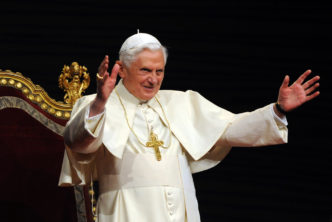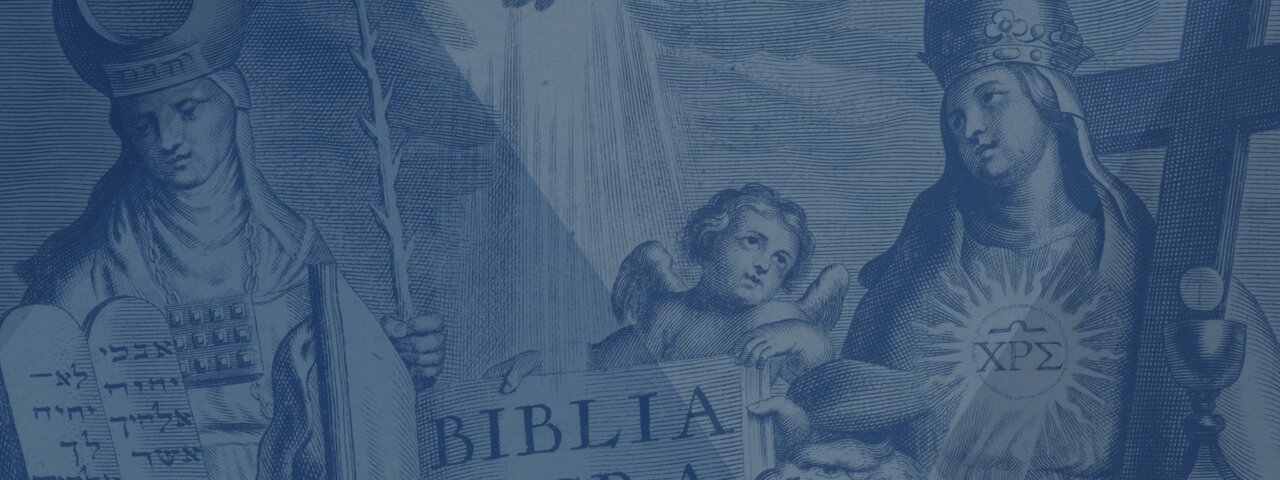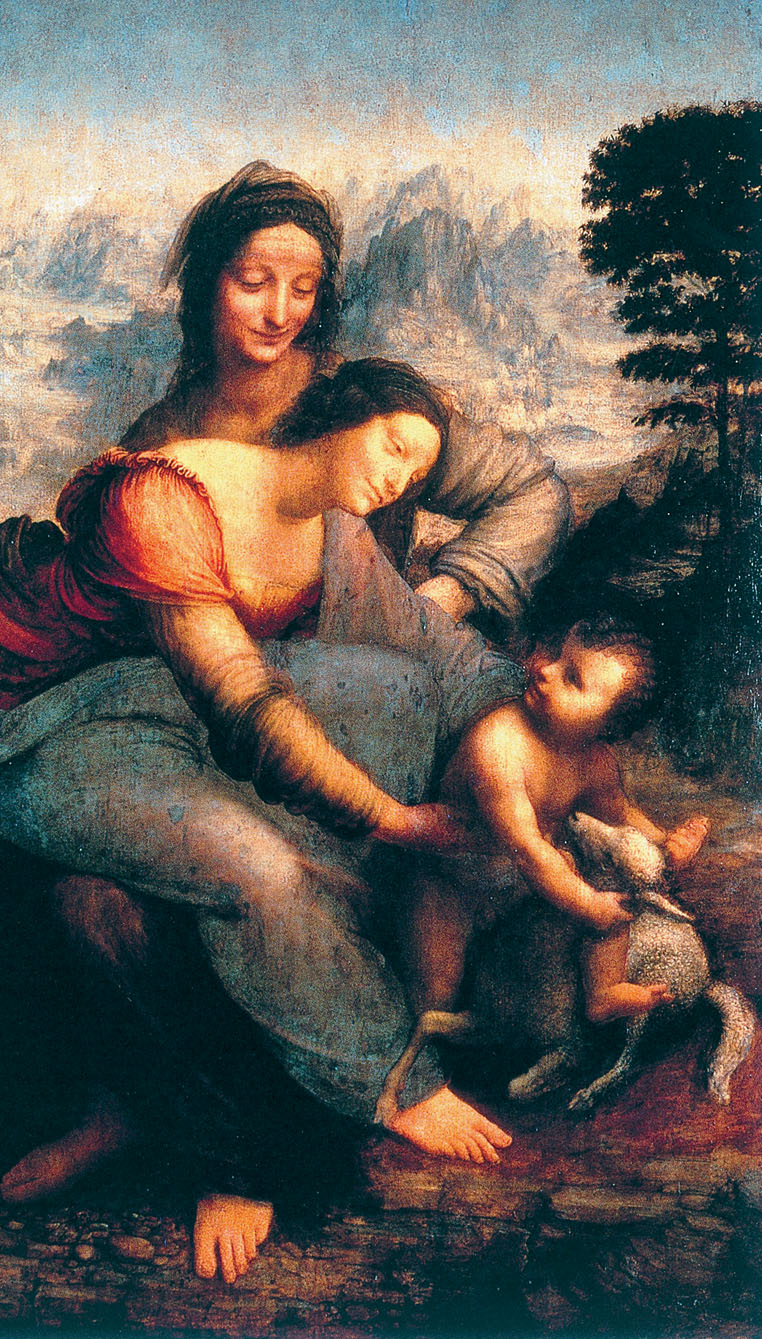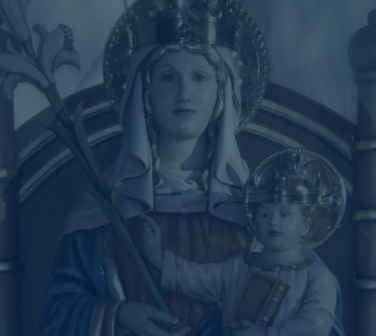 The Schism in the Church was first and foremost a schism in the College of Cardinals, a schism that lined up generally with the sides of the contemporary Hundred Years War between England and France. Once there were two lines of popes established, however, it became very difficult to conceive of a solution. One theory that was advanced was that a council—dominated of course by the cardinals—was in fact the highest authority in the Church. What this meant was that a council could depose both popes and elect a new one. In 1409, during a period of peace in the Hundred Years War, when the belligerent countries had less interest in “winning” the schism, cardinals from both popes defected and met in council in Pisa. They deposed the rival popes and elected a third. Of course, neither the Roman nor the Avignon pope recognized the depositions as valid, and so the Church was left with three popes. This situation was totally unacceptable and whatever support the rival popes could maintain began to erode in favor of the conciliar solution. Gregory XII, the legitimate pope of the Roman line, was not willing to allow the power of the papacy to be completely gutted by a council, and so he agreed that if a council deposed the two anti-popes, he would approve its acts and then resign himself, leaving the council to elect a new pope for the whole Church. This is exactly what happened at the Council of Constance in 1415. Gregory XII resigned and became the Dean of the newly re-united College of Cardinals. The council, however, did not proceed to the election of the next pope, Martin V, until 1417, after Gregory had died. So, the potentially problematic situation of having two popes alive at the same time was avoided.
The Schism in the Church was first and foremost a schism in the College of Cardinals, a schism that lined up generally with the sides of the contemporary Hundred Years War between England and France. Once there were two lines of popes established, however, it became very difficult to conceive of a solution. One theory that was advanced was that a council—dominated of course by the cardinals—was in fact the highest authority in the Church. What this meant was that a council could depose both popes and elect a new one. In 1409, during a period of peace in the Hundred Years War, when the belligerent countries had less interest in “winning” the schism, cardinals from both popes defected and met in council in Pisa. They deposed the rival popes and elected a third. Of course, neither the Roman nor the Avignon pope recognized the depositions as valid, and so the Church was left with three popes. This situation was totally unacceptable and whatever support the rival popes could maintain began to erode in favor of the conciliar solution. Gregory XII, the legitimate pope of the Roman line, was not willing to allow the power of the papacy to be completely gutted by a council, and so he agreed that if a council deposed the two anti-popes, he would approve its acts and then resign himself, leaving the council to elect a new pope for the whole Church. This is exactly what happened at the Council of Constance in 1415. Gregory XII resigned and became the Dean of the newly re-united College of Cardinals. The council, however, did not proceed to the election of the next pope, Martin V, until 1417, after Gregory had died. So, the potentially problematic situation of having two popes alive at the same time was avoided.
With the election of Martin V, the papacy entered a new phase in its history. The strength of the Church as an institution had been severely weakened by the schism. Not only had the papacy’s prestige been hurt immensely, but over the course of the conflict, both papal lines had traded away a great deal of their governmental powers to the various princes of Europe. By the time the schism ended, the papacy had a fraction of the institutional power in the Church that it had in the mid-14th century. In fact, it is not too much of a conceptual stretch to start seeing Europe as a collection of national churches, led by their monarchs, yet united in doctrine. The constellation of circumstances that had led to the immense power of the cardinals and to the problems of papal vacancies and ultimately schism had largely faded away, and the papacy began facing a new problem, that of how to retain its independence from powerful monarchs who had near absolute control over the churches in their kingdoms. The solution was for the popes to construct their own church/kingdom in central Italy, which became the major project of the Renaissance papacy.
Conclusion
As we have seen, there have been three periods in which papal resignations have occurred. In each one the resignations were an aspect of the Church’s attempts at dealing with some crisis. In the ancient period, the problem was that of persecution; in the eleventh century it was the problem of corruption and irregular elections; in the High and Late Middle Ages the problem had to do with the power of the cardinals and the interference of increasingly powerful kingdoms in the election of popes, leading to long papal vacancies. In each case, though, the resignations themselves were largely incidental to the solution to the problem at hand. What Benedict XVI is doing is, therefore, novel. Because the Holy Father seems to be suggesting papal resignation itself as the solution to the problem of aged pontiffs in the fast-paced modern world. Benedict is suggesting that the Church requires a pontiff of a certain vigor and that when he is no longer capable of performing at this level, it is appropriate for him to step down. If this is the case and if papal resignations become a viable, even a normal, way for pontificates to come to an end, it will be a development in the papal office of the same magnitude as the eleventh-century constitution of the cardinals as papal electors or the thirteenth-century establishment of the Conclave. For this reason, it is a mistake to view the primary historical interest of Benedict’s resignation to be simply that papal resignations are rare and haven’t happened in a long time. Rather, we are potentially witnessing major development in the papal office. As with so many things in the Catholic Church, only time will tell.






Thank you Andrew for a very informative and helpful article (so much work and so quickly!).
Thank you fgh for such a good response.
And now thank God for such a great blessing to his Church in giving us Pope Francis!
Father Kevin.
I must admit, as a fairly new convert (1 year ago), I am somewhat surprised and a little shaken over the resignation. I think my feelings stem from my mormon experience of 20 years, where the prophet, a spokesperson for God, is appointed for life. I was looking to the Pope as a spokes person for Christ, chosen by God, and as such resignation was not an option. The pope in my mind is the visible face of Christ. So I am having trouble wraping my mind around it. The Church just seems so complicated. Perhaps my expectations are just to high for the leaders of the Church, because there seems to be constant scandal in the heiarchy. I know the press only highlights the evil, because I know there are many good and righteous men in leadership. I am determined to remain in the Church because in the end we all have to answer to God on our own merits and not the merits of others. Sorry to get so personal
Remember two things:
• There is no new teaching going on here. The option to resign has been there a long time. It just hasn’t been used very often.
• If the Holy Spirit is leading the pope, then, presumably, he was leading him in this decision as well.
As for scandals, one of the reasons it’s been so bad lately is precisely because JPII was very ill for a very long time, and didn’t quite have what it takes to prevent them, or at least deal with them early on. So they kept growing and festering, until they finally burst wide open and his successor had to try to clean up the mess. It’s a lot easier, and a lot less messy, to take out a splinter than to cure gangrene. And it’s a lot easier to do either if you’re 60 than if you’re 85.
As Prefect of the CDF, Cardinal Ratzinger saw better than anyone how much was left undone when JPII got too old and too ill to do the mundane part of the job properly, and how bad that was for the Church. He also knows very well that the weaker the pope, the stronger the Curia. And the Curia ruling in the name of the pope is generally not a good thing. Christ’s promise was to Peter, not the Curia.
When Benedict took over, much of the Church’s focus was on the pope. He has spent much of his influence on trying to move that focus away from himself and over to Christ. In many ways his resignation can be seen as yet another nudge in that direction.
Andrew’s article is very informative, yet speculative concerning Pope Benedict’s motives. My perspective as a convert Catholic perhaps is not as affected by the resignation of the pope; just as likely it does not greatly affect me since I am also underneath Patriarch Sviatoslav. Incidently, Patriarch Sviatoslav is perhaps one of the youngest elected as Patriarch in 2011 in the Ukrainian Greek Catholic Church (UGCC) at the age of 40. However, there may be several other reasons in his election despite his age; and until the election of a new pope is made, we may not fully understand Pope Benedict’s resignation from the normal historical practice. At any rate, I do not see why so many cradles place so much stock into the pope’s personality. A pope is not a rock star, much less a cult of personality that seems to be similar to President Obama’s appeal in a declining America. The Church does not need a popular pope, it needs a pope with leadership to maintain the integrity of the Gospel that has been entrusted to it. Hence, the Church needs to deal with the homoheresy and errors of feminism that is attempting to enter within the sentiment of cafeteria Catholics. We are presently in the year of faith where Catholics need to understand the teachings of the Church do not bend or sway to the outside world’s pressure. The election of the new pope will not please the media because of the conservative nature of the Church; as I recall their attacks on Pope Benedict when elected was condemned and he was ridiculed for being a Nazi Youth due to being forced. Just as likely, the Media will turn against the newly elected Pope as they speak out against abortion, homosexuality, and feminism.
Pax Et Bonum,
Stephen
Assuming that there are no ulterior motives (I don’t believe that there are), I tend to view Benedict’s resignation as an action of extreme humility and love for the good of his church.
While popular media has predominately painted his actions as a cover or prelude to scandal, in my opinion, this simply highlights a sickness of our culture: the voyeuristic lust for scandal. (See: https://onbehalfofall.org/2013/02/11/the-resignation-of-benedict-xvi-and-the-lust-for-scandal/)
However, as you have thoroughly demonstrated in this series of posts, his act of humility (as I take it) is still somewhat unique in the history of the western church. It will be interesting to see where this precedent takes future popes, or how it might fuel further developments.
Great work, Andrew!
In peace,
Vincent